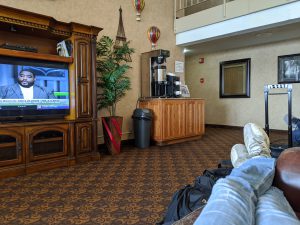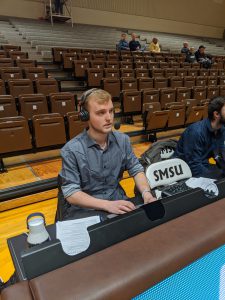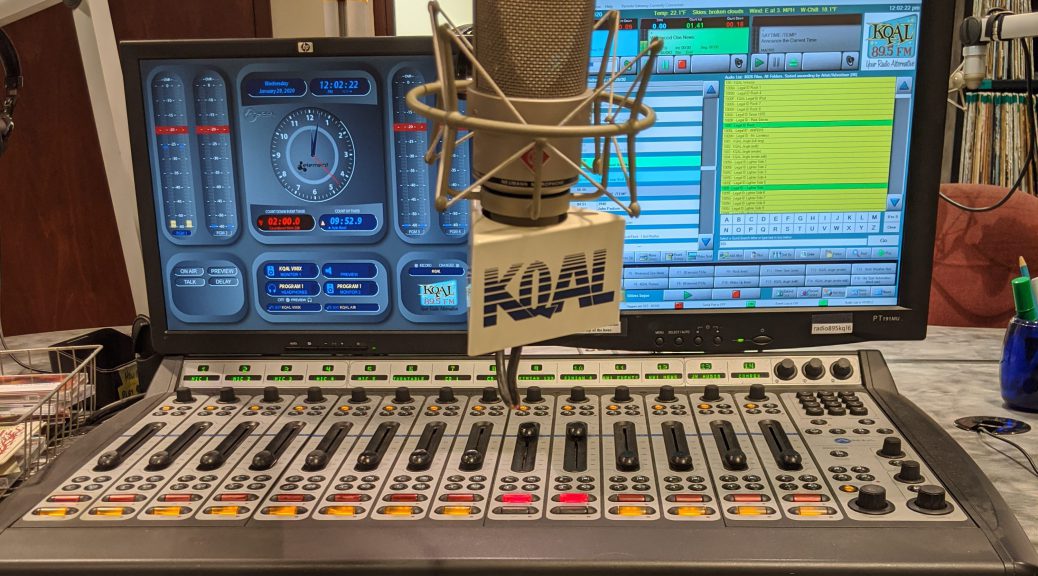I wake up, It’s Thursday.
The Winona State University women’s basketball team leaves today at 3:30 p.m. for games in Marshall, Minnesota and Sioux Falls, South Dakota.
I, being the radio guy, cannot miss the bus as the men’s team does not arrive before the start of the women’s game.
Time to pack my bag and prepare for the fourth weekend on the road this season.
I’m a bit nervous as I’ve never really got on talking terms with any of the players.
They all do their thing while I sit there quietly and mind my business.
I’ve covered the WSU basketball teams for three years while working at the campus radio station, 89.5 KQAL, so you’d think I’d have a better relationship than this.
It’s just not the case.
I get to the bus stop, say hello to Coach Scott Ballard, and take my seat.
I’ve debated sparking conversation, but I don’t feel like the team is interested in my small talk, plus I feel like they discuss basketball enough as it is already.
Hours later, we arrived in Marshall.
They eat their team meal together at Texas Roadhouse or Pizza Ranch, I usually eat off to the side, then we head to the hotel for the night.
I’ve said two words since the start of the trip.

Being secluded and keeping to myself isn’t what I’d like to be doing, it just happens.
The nerves of saying something stupid or sitting where someone else wants to sit triggers my anxiety.
My boss and longtime radio professional Doug Westerman explained that it’s not unusual for radio personal to be introverts off the air.
“They just want that high energy ‘Hey everyone! Blah blah blah we got a great day in store for you!’ then all of sudden you’re walking down the hallway and they give you a nervous ‘hi.’”
How could someone be an introvert and be on the radio where you talk for hours?
Pat Broe, former KQAL Program Director and Sports Director, described the flipping of the switch from off-air to on-air as being trapped in a corner with no way out.
“There’s something about when that red light comes on that you have to start, you can’t do anything but be that person,” Broe said. “You’re trapped in a corner, you are live on air, there’s thousands of people listening to you, and you have to figure out a way to entertain them.”
Sounds pretty intense, but I found that to be accurate.

In the morning I checked out of my room at 11 a.m.
I sit in the hotel lobby until we leave for the game at 3 p.m.
5 o’clock rolled around and I plugged in the comrex, got my mics into position, and waited for my producer Ryan “Baby Shaq” Mandli to send the call my way.
“That’s going to do it for the Warrior Tip-Off Show as Buck Wallert is waiting in the R/A Facility in Marshall Minnesota, take it away Buck,” Baby Shaq said.
And I picked it right up with, “Welcome to the R/A Facility over here in Marshall Minnesota as we have a good match up in store for you tonight as your Winona State Warriors take on….”
Like that flip of a switch, I was in a zone.

From saying two words in almost an entire day, to rattling off names, stats, and match up history, you would think I knew these players their whole lives.
Anything to paint the best picture possible for the listeners back home, as according to Doug Westerman, “radio is the theatre of the mind.”
Not talking at all, to saying thousands of words, then right back to not talking after the game bothered me.
It just didn’t make sense.
Mike Martin the original KQAL radio jock and now the guy who keeps the radio station going, met with me the next day and explained how radio gives you confidence.
“It makes you think on your feet, spontaneously, and being kind of a shy kid, you’re doing it in a room by yourself, so that kind of helps too,” Martin said. “You’re talking to people, but they aren’t right in front of you. You’re by yourself, but you’re not talking to yourself, there’s maybe hundreds of people.”
Thinking of the amount of people listening to me makes me even more nervous, do I sound okay? What if I say something I shouldn’t or panic?
And panic is just what I did the first time on air.
Pat Broe reflected on the first time we were thrown into the spotlight.
“It’s a day you and I will never forget. I was producing and co-hosting, you were hosting, and neither of us knew what the heck we were doing. TJ Leverentz and Tyler Jeffries kind of just gave us the keys and let us go and let us fail, and we did,” Broe said. “I think we went to commercial 25 or more times; we didn’t turn our mics off one time, and there might have been a word that the FCC doesn’t like that got on the air. Basically, anything that could have gone wrong went wrong.”
That was just over three years ago.
Now when I go on air, I have fun with it, take it and run.
Notes or no notes I was going to think of something.
“It’s so funny too, I thought I was prepared for that day, I thought I had enough information to put a show together, but I was not even remotely close,” Broe said. “Now putting together a pregame show is easy.”
But it’s not always as easy as he says, when you’re having a bad day, you still have to be happy go lucky on air.
Martin explained this well when talking about his experience as a disc jockey.
“I had been just having a horrible bad day or something, and I was just grumpy…. Then I flip the mic on and immediately I’m cheering and I gotta play the role, I gotta play the radio guy,” Martin said. “Flipped the mic off again and went back into grumpy mode. This other guy in the control room with me said ‘how did you do that, how did you just change personality like that.’ And I’m just like ‘hey, that’s what they pay me to do.’”
I receive $20 for each game I call, as well as the free hotel rooms and couple of meals.
But, the radio has given me a voice, so I’d say I’m living the dream.
